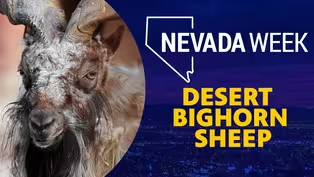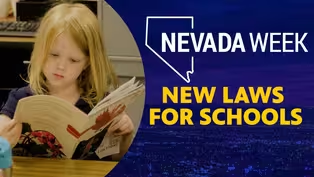
Update on Southern Nevada’s Drought
Clip: Season 8 Episode 5 | 8m 37sVideo has Closed Captions
Southern Nevadans fight water fees, while seven states work on a new deal sharing Colorado River.l
Some Southern Nevadans fight excessive water fees, while seven states work on a new deal to share the Colorado River.
Problems playing video? | Closed Captioning Feedback
Problems playing video? | Closed Captioning Feedback
Nevada Week is a local public television program presented by Vegas PBS

Update on Southern Nevada’s Drought
Clip: Season 8 Episode 5 | 8m 37sVideo has Closed Captions
Some Southern Nevadans fight excessive water fees, while seven states work on a new deal to share the Colorado River.
Problems playing video? | Closed Captioning Feedback
How to Watch Nevada Week
Nevada Week is available to stream on pbs.org and the free PBS App, available on iPhone, Apple TV, Android TV, Android smartphones, Amazon Fire TV, Amazon Fire Tablet, Roku, Samsung Smart TV, and Vizio.
Providing Support for PBS.org
Learn Moreabout PBS online sponsorshipOur drought coverage continues with the US Bureau of Reclamation projecting historically low levels of water at Lake Mead, what that means for local water restrictions.
Alan Halaly, Water Reporter for the Las Vegas Review-Journal, joins us now.
Alan, how low are these levels?
(Alan Halaly) Yeah.
I mean, that's the hot topic right now.
Down in 2022 we had the historic low of 1,040, which is when all those national headlines were generated, when the bodies came up to the surface, you could say, literally.
So, yeah, I mean-- -We shouldn't laugh.
-And you know, this most recent projection is in-- You know, there's a high, middle, and low that is always released every month, and the middle one that's the most probable did show us going below that 1,040 level again.
And that has big implications for us here in Southern Nevada.
Lake Mead is our main water source.
It's where we source 90% of our entire water supply.
So it should be something that we pay attention to, especially as it pertains to how we're implementing these water restrictions locally.
-And those projections are over two years?
-Correct.
-So when is it projected that it will-- -I believe it's June 2027.
-2027, okay.
As for watering restrictions right now, they will be determined in August if they change, correct?
-Correct.
-How do they stand to be impacted by this?
-Right.
So if you talk to the Southern Nevada Water Authority, they're going to tell you that we are completely prepared for any level of shortage that is put forth by-- within the law.
And I think that that's true.
We've done a lot of water planning to make sure that we have water in reserves.
We put water into the ground to bank it, for example, into our aquifer.
And, you know, there's reservoirs throughout the valley.
So we're well prepared and-- -But do you foresee those restrictions changing?
-I don't.
We're going to probably see what is known as the Tier 1 restriction, which is pretty par for the course for where we've been.
We dipped down into a Tier 2 projection a couple years ago.
But, yeah, it's interesting to think about, you know, Nevada is afforded the smallest amount of the river of any state, and we're kind of lumped in with California and Arizona in the Lower Basin.
So it's interesting to see how that plays out here locally, as we are a relatively smaller community compared to California or Arizona.
-Who is hurting the most from the water restrictions that are currently in place?
-Right.
So there's been a lot of controversy, I think, about how we're really apportioning these water restrictions.
The Las Vegas Valley Water District has since 2023 charged its users what they call excessive use charges.
That means that above a certain rate that changes every month, you know, they are charged this flat fee that is meant to rein in those top 10% of the water users, you know, your casino bigwigs or folks that are living in these large lots.
But there has been some criticism of that because it's affecting families as well, folks that have these larger lots.
They're saying that it isn't quite, I guess, calculated in a fair way in their opinion.
There's this group called the Water Fairness Coalition that has been kind of championing some of those reforms and going to those public meetings and making their voices heard.
There's actually a lawsuit that was filed yesterday where a Summerlin lawyer went back and forth with the Water Authority, and it's really one of the first legal challenges we've seen to these excessive use charges that have been so controversial.
In a way, it's like these, this controversy is boiling over.
And they're even considering a class action suit to get some of that money back, because they don't think that these restrictions are being enforced in a fair way.
-And that lawsuit is some of your most recent reporting.
What is this person claiming?
What is the basis of of this lawsuit?
-Well, I mean, according to this lawyer, because there is no appeals process to-- a formal appeals process to these excessive use charges, he thinks it's a violation of the Nevada constitution and a-- -So if I am charged an excessive use fee, I have no way of appealing it?
-No, you don't.
I mean, what the Water District will tell you is that they'll come out to your property, assess your property for leaks, and will want you to change it.
But somebody like this, this lawyer, Sam Castor who, you know-- Really, the answer was he had a lot of grass on his property, which, you know, in many people's opinion, does have benefits to combating heat islands and making sure that we're staying cool in the desert.
So, yeah, I mean, it was a lot of back and forth, and there are remedies that the Water District does offer to, you know, fix leaks on your property and they will help you, but it does seem like some residents do get stonewalled when they really do try and in good faith fix what's happening on their property.
-And the Water Authority has made it seem like top 10% of water users within the state, that's who they're going after.
And who fits into that category?
-It really runs the gamut, I think.
You know, there are folks that regularly grace the top 10 water user lists that comes out every year, one of them being, for instance, Dana White.
And you know, there's even the Sultan of Brunei has a home in Las Vegas.
-I'm so glad you brought that up.
Who is the Sultan of Brunei?
-He's a royal that is from the country of Brunei, and he does have a home here in Las Vegas that really does top that list every year when it comes out.
So it's really those folks that the Water Authority is trying to target with these fees, trying to-- They do acknowledge that they're punitive and that they're not meant to be something that they charge over and over again.
But for those really high water users that don't seem receptive to other measures, you know, it's just another way to generate revenue for conservation in their opinion.
-You brought up Nevada's role in the Colorado River.
The current operating guidelines for all seven states that utilize that river, it expires at the end of next year, end of 2026, so negotiations have been underway.
Where do they stand?
-It's not looking good, Amber.
You know, I think there's a lot of factors at play here.
All of these meetings happen behind closed doors, and for those who don't know, every state in the Basin, there are seven of them, their governor appoints a czar who is responsible for negotiating on behalf of that state's interest.
That for us is John Ensminger, the general manager of the Water Authority.
And you know, it is hard to really get a peek into this process.
It seems like, you know, there has been a general sense of receding from the public.
All the negotiators, generally, will meet at the conference in Las Vegas, the Colorado River Water Users Association.
They declined to do that for the first time in decades, as I understand.
-That's an indication it's not going well.
-It's not going well.
And the same thing happened in Colorado with the Getches-Wilkinson Conference.
They didn't even go to that one.
-And some of your most recent reporting about this topic mentioned a divorce.
What do you mean by that?
-So, as I understand it, this proposal, which the details are still being ironed out, but it's something that they're all considering is the Lower and Upper Basin would essentially only tie-- Their only tie would be releases from Lake Powell, which is based on a three-year average from Lees Ferry.
As to what that looks like in practice, it's really unclear until we see some numbers; but essentially, it's being painted as this divorce, conscious uncoupling, where the Lower Basin and Upper Basin can't agree on what to do in the face of climate change and declining water availability.
So in many ways, they would be really only tying themselves by these releases from Lake Powell, which, of course, do end up in Lake Mead and are important for the Lower Basin.
-Which would be a monumental shift, as our viewers can read from your reporting.
Thank you so much for joining Nevada Week.
Video has Closed Captions
Clip: S8 Ep5 | 7m 9s | The on-going drought means Nevada’s iconic desert bighorn sheep need to be moved out of the state. (7m 9s)
Video has Closed Captions
Clip: S8 Ep5 | 10m 2s | New laws passed by the Nevada Legislature will impact the new school year. (10m 2s)
Providing Support for PBS.org
Learn Moreabout PBS online sponsorship
- News and Public Affairs

Top journalists deliver compelling original analysis of the hour's headlines.

- News and Public Affairs

FRONTLINE is investigative journalism that questions, explains and changes our world.












Support for PBS provided by:
Nevada Week is a local public television program presented by Vegas PBS

